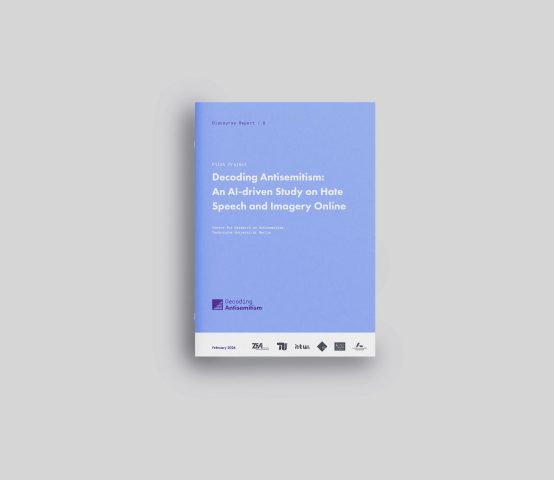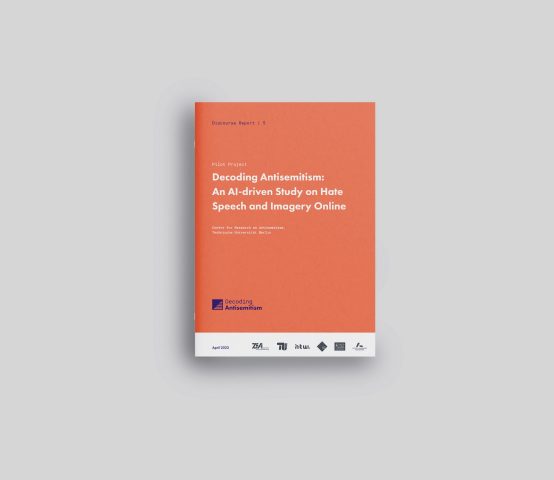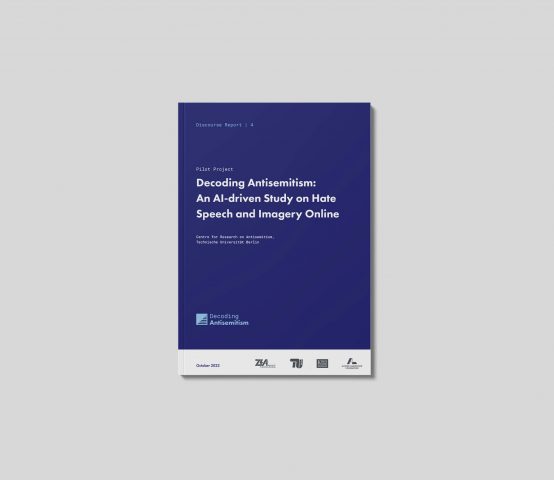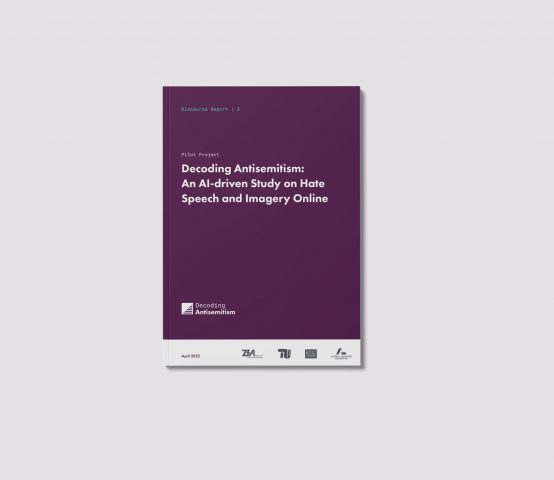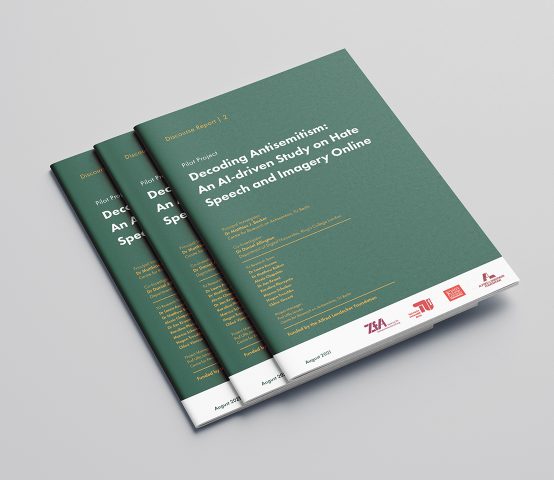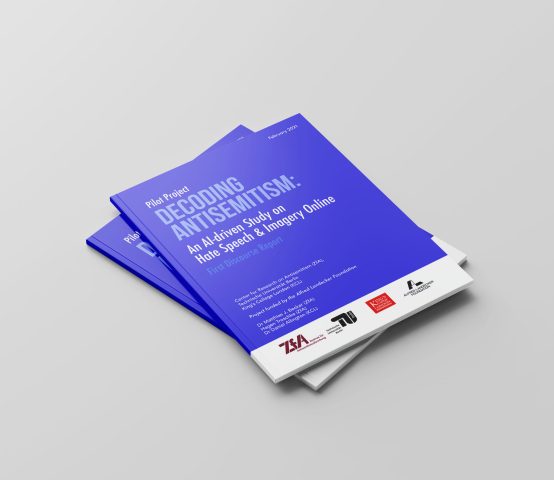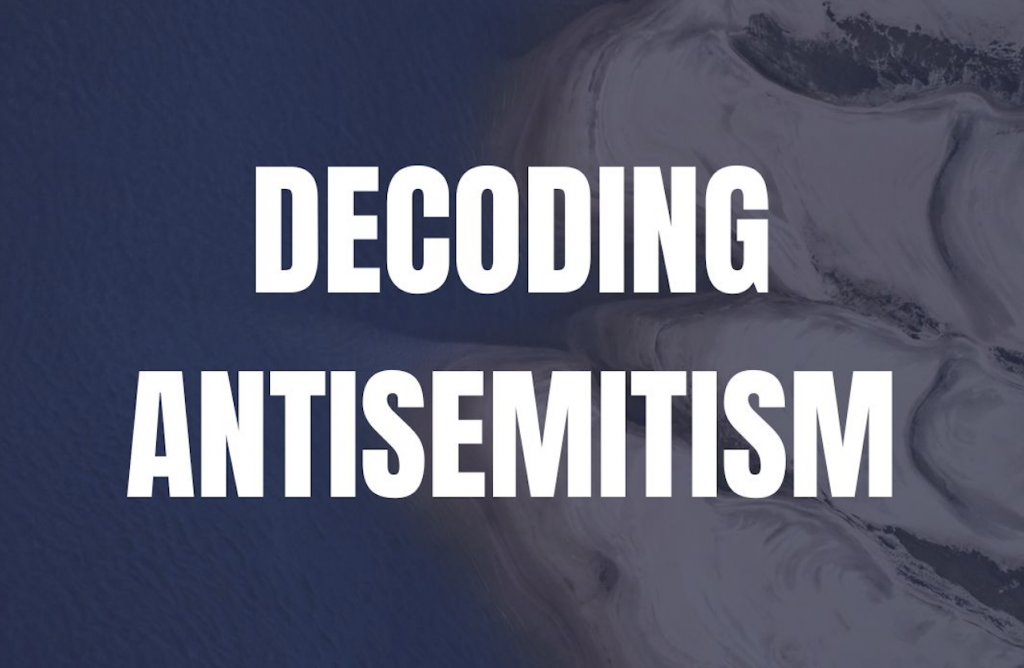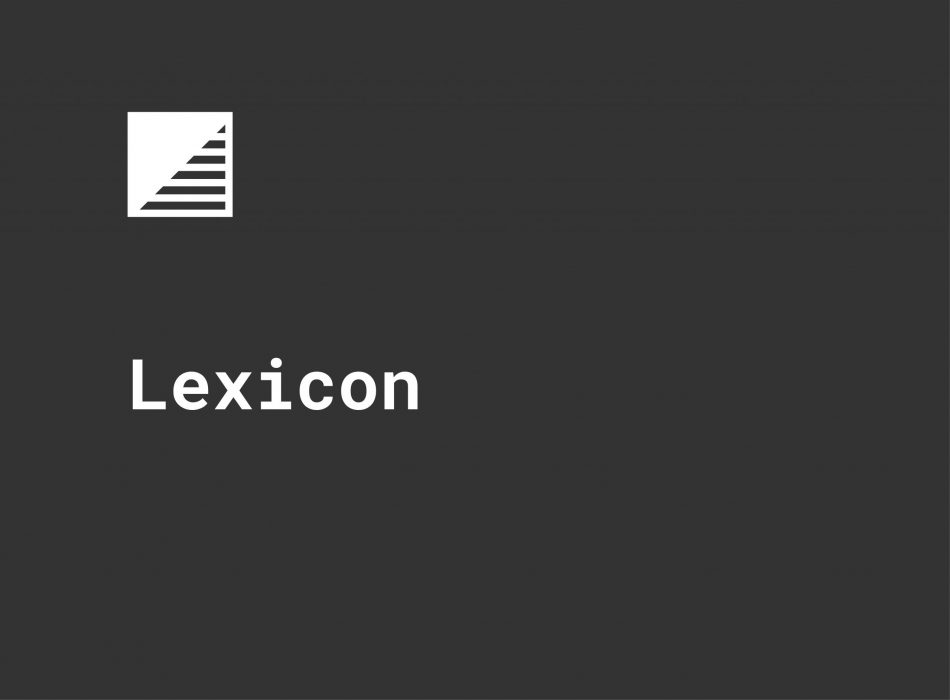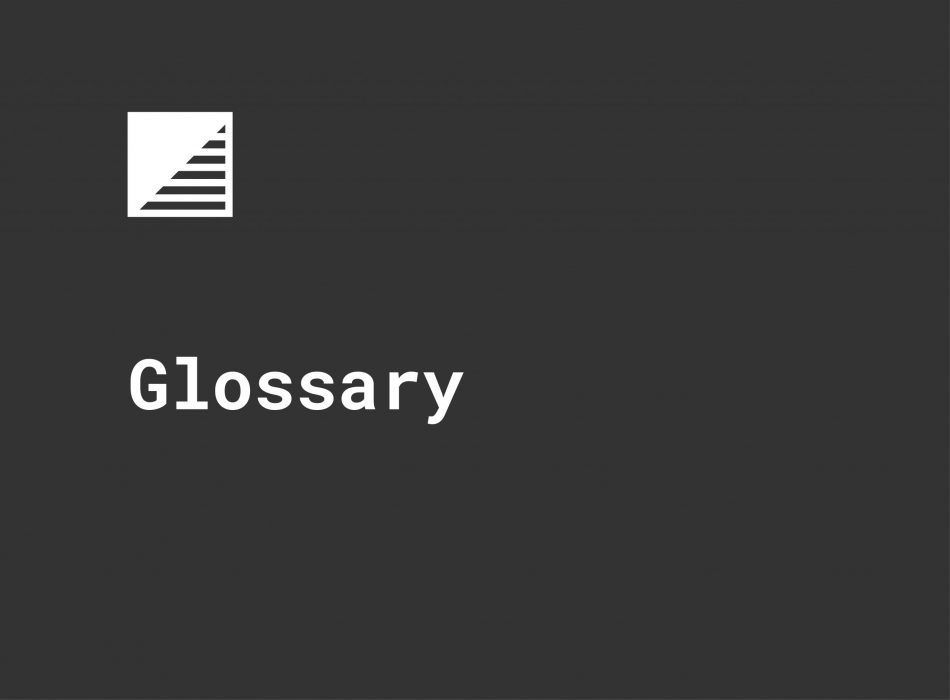Decoding Antisemitism
An AI-driven Study on Hate Speech & Imagery Online
The three-year pilot project “Decoding Antisemitism,” carried out by a research team at the Centre for Research on Antisemitism (ZfA, TU Berlin) in collaboration with HTW Berlin, University of Michigan—School of Information, Cardiff’s HateLab and King’s College London, and examines explicit and implicit antisemitism on leading social media.
The sixth Discourse Report analyses online antisemitism in the wake of the 7 October Hamas attacks and subsequent Israeli actions in Gaza. It also tracks the reactions to Elon Musk’s high-profile comments about Jews and Jewish organisations, as well as reflecting on the project’s evolution over the past 3.5 years.
The fifth Discourse Report analyses online comments in reaction to statements of rapper Kanye West, to 2022 FIFA World Cup in Qatar, and to the Israeli legislative elections. In addition, it presents an evaluation of existing tools for the automated detection of hate speech and presents an innovative approach based on transfer learning.
The fourth Discourse Report investigates two major international events: the Russian invasion of Ukraine and an eruption of terrorist violence in Israel in early 2022. It also examines four national case studies which illustrate the adaptability of contemporary anti-Jewish prejudice.
The third Discourse Report sheds light on the differences and similarities of antisemitic responses – particularly Holocaust distortion – to two discourse events in France and Germany: the anti-health pass demonstrations and the prosecution of former concentration camp personnel.
Videos
Watch the recordings of our conference and project related presentations of our team members
after 7 October'

By loading the video, you agree to YouTube's privacy policy.
Learn more

By loading the video, you agree to YouTube's privacy policy.
Learn more

By loading the video, you agree to YouTube's privacy policy.
Learn more

By loading the video, you agree to YouTube's privacy policy.
Learn more

By loading the video, you agree to YouTube's privacy policy.
Learn more

By loading the video, you agree to YouTube's privacy policy.
Learn more
Study of Contemporary Antisemitism

By loading the video, you agree to YouTube's privacy policy.
Learn more
Guides and Working Papers
Scientific Books & Articles
Becker, Matthias J.; Fillies, Jan (forthcoming). “KI im Trainingslager: Wie Künstliche Intelligenz gegen antisemitische Codes und die Normalisierung von Hassrede im Netz eingesetzt werden kann”, In: Deborah Schnabel, Eva Berendsen, Leo Fischer, Marie-Sophie Adeoso (eds.): Code & Vorurteil. Über Künstliche Intelligenz, Rassismus und Antisemitismus. Berlin: Verbrecher Verlag.
Becker, Matthias J.; Bolton, Matthew (forthcoming). ‘Images of Zionism in the Age of the Internet,’ In: The Routledge Handbook on Zionism (eds. Colin Shindler), Routledge,.
Becker, Matthias J. (2024). “Antisemitismus online in impliziter Gestalt: Einblicke in die Ergebnisse des Decoding Antisemitism-Projektes”, In: Anders Denken. Die Onlineplattform für Antisemitismuskritik und Bildungsarbeit.
Placzynta, Karolina (2024). ‘But this time it’s real.’ Annotation of training datasets for better automatic detection of implicit Holocaust denial and distortion online, In: Institute for Strategic Dialogue, The Fragility of Freedom: Online Holocaust Denial and Distortion, 26-28.
Scheiber, Marcus; Troschke, Hagen; Krasni, Jan (forthcoming). Vom kommunikativen Phänomen zum gesellschaftlichen Problem: Wie Antisemitismus durch Memes viral wird.
Becker, Matthias J.; Ascone, Laura; Bolton, Matthew; Chapelan, Alexis; Haupeltshofer, Pia; Krugel, Alexa; Placzynta, Karolina; Scheiber, Marcus; Tschiskale, Victor (2023). Celebrating Terror: antisemitism online after the Hamas attacks on Israel: Preliminary Results I. Berlin: Technische Universität Berlin. Centre for Research on Antisemitism, https://doi.org/10.14279/depositonce-19143.
***
Ascone, Laura (2023). “Embrigadement”, In: Nolwenn Lorenzi Bailly, Claudine Moïse (eds.), “Antisémitisme”, Discours de haine et de radicalisation: Les notions clés. Lyon: ENS Èditions, 127-133.
Ascone, Laura; Moïse, Claudine. “Antisémitisme”, In: Nolwenn Lorenzi Bailly, Claudine Moïse (eds.), Discours de haine et de radicalisation: Les notions clés. Lyon: ENS Éditions, 311-320.
Ascone, Laura; Placzynta, Karolina; Vincent, Chloé (2023). Gegennarrative gegen antisemitische Hatespeech. Eine vergleichende Studie französischer und britischer Online-Kommentarspalten, In: Wissen schafft Demokratie. Schwerpunkt Netzkulturen und Plattformpolitiken 14, 164-177.
Becker, Matthias J.; Scheiber, Marcus (2023): „Decoding Antisemitism”. Die interdisziplinäre Analyse judenfeindlicher Hassrede im Internet, In: Stefanie Schüler-Springorum (Ed.) Jahrbuch für Antisemitismusforschung 32, Metropol Verlag.
Becker, Matthias J.; Troschke, Hagen (2023). “Decoding Implicit Hate Speech – Using the Example of Antisemitism,” In: Christian Strippel, Sünje Paasch-Colberg, Martin Emmer, Joachim Trebbe (eds.). Challenges and Perspectives of Hate Speech Analysis: An Interdisciplinary Anthology. Berlin: Digital Communication Research, 335-352.
Bolton, Matthew (2023). “The Three Best Books on Critical Theory and Antisemitism, recommended by Matthew Bolton,” In: Fathom Journal.
Bolton, Matthew (2023). ‘Three Theories of Separation: Kelsen, Schmitt and Pashukanis and the historical development of the legal form,’ In: Philosophy & Social Criticism.
Bolton, Matthew (2023). ‘Antisemitism in the British New Liberalism movement,’ In: Marcel Stoetzler (eds.) Critical Theories of Antisemitism, Routledge.
Bolton, Matthew (2023). ‘Climate Catastrophe, The ‘Zionist Entity’ and ‘The German Guy’: an anatomy of Malm-Jappe debate,’ In: David Hirsh (eds.) The Rebirth of Antisemitism in the 21st Century, Routledge.
Bolton, Matthew (2023). ‘What Corbyn’s favourite sociologists get wrong about antisemitism,’ In: Alan Johnson (eds.) Mapping the New Left Antisemitism: The Fathom Essays, Routledge.
Bolton, Matthew (2023). David L. Bernstein (2022), Wicked Son [book review], In: Journal of Contemporary Antisemitism.
Bolton, Matthew; Fitts, F.H. (2023). ‘ Labour, Antisemitism and the Critique of Political Economy,’ In: Marcel Stoetzler (eds.) Critical Theories of Antisemitism, Bloomsbury.
Bolton, Matthew; Ascone, Laura; Becker, Matthias J.; Placzynta, Karolina. Enabling Concepts in Hate Speech: The Function of the Apartheid Analogy in Antisemitic Online Discourse About Israel, In: Dans I. Ermida (Ed.), Hate Speech in Social Media: Linguistic Approaches. London: Palgrave, 253-286.
Chapelan, Alexis (2023). “Des ‘catholiques non-croyants’? Memoire identitaire et empreinte affective du catholicisme dans le discours des intellectuels conservateurs quebecois. Le cas de Mathieu Bock-Côté”, In: Revista Romana de Sociologie 34 (1-2).
Chapelan, Alexis; Costea, Vlamidir A.(expected 2023). Le Bon, la Brute et le Truand. La crise de la Covid-19 et les ambiguïtés de la construction de la figure de l’expert médical dans la grammaire politique populiste, In: Christophe Premat, Jean-Michel De Waele, Michel Perottino (eds.), Comparing the role of experts during the COVID-19 pandemic, Stockholm: Stockholm University Press. Volume in press.
Chapelan, Alexis; Ascone, Laura; Becker, Matthias J.; Bolton, Matthew; Haupeltshofer, Pia; Krasni, Jan; Krugel, Alexa; Mihaljević, Helena; Placzynta, Karolina; Pustet, Milena; Scheiber, Marcus; Steffen, Elisabeth; Troschke, Hagen; Tschiskale, Victor; Vincent, Chloé (2023). Decoding Antisemitism: An AI-driven Study on Hate Speech and Imagery Online. Discourse Report 5. Berlin: Technische Universität Berlin. Centre for Research on Antisemitism.
Krasni, Jan; Kranert, Michael; Maesse, Jens; Psyllakou, Elena (eds.) (expected 2023). Special Collection Corona discourse(s) remaking the world: experts, politics, media and everyday life (2020–2022) https://www.nature.com/collections/jijeecfcga/.
Placzynta, Karolina (2023). “Never Forget Your Name: The Children of Auschwitz,” In: Journal of Contemporary Antisemitism (JC 5.2).
Placzynta, Karolina (2023). “Patterns of Antisemitism in Mainstream Media Comment Threads. Case Studies of the UK, France and Germany,” In: Fathom Journal.
Ascone, Laura (2022). Discrediting the Other, Building In-Group Bonds: An analysis of French and Italian user-generated contents, In: Angeliki Monnier, Axel Boursier, Annabelle Seoane (eds.), Cyberhate in the Context of Migrations. London: Palgrave, 63–82.
Ascone, Laura; Becker, Matthias, J.; Bolton, Matthew; Chapelan, Alexis; Krasni, Jan; Placzynta, Karolina; Scheiber, Marcus; Troschke, Hagen; Vincent, Chloé (2022). Decoding Antisemitism: An AI-driven Study on Hate Speech and Imagery Online. Discourse Report 3. Berlin: Technische Universität Berlin. Center for Research on Antisemitism.
Ascone, Laura; Placzynta, Karolina; Troschke, Hagen (2022). Antisemitic Hate Speech in Social Media Comments: An Interdisciplinary Mixed-Methods Corpus Study, In: Jarmo Harri Jantunen, Johanna Kalja-Voima, Matti Laukkarinen, Anna Puupponen, Magareta Salonen, Tuija Saresma, Jenny Tarvainen, Sabine Ylönen (eds.), Diversity of Methods and Materials in Digital Human Sciences. Proceedings of the Digital Research Data and Human Sciences 2022, December 1-3, Jyväskylä, Finland. Jyväskylä: University of Jyväskylä, 1-11.
Becker, Matthias J.; Ascone, Laura; Troschke, Hagen (2023). “Antisemitic comments on Facebook pages of leading British, French, and German media outlets,” In: Humanities & Social Sciences Communication.
Becker, Matthias J.; Ascone, Laura; Bolton, Metthew; Chapelan, Alexis; Krasni, Jan; Placzynta, Karolina; Scheiber, Marcus; Troschke, Hagen; Vincent, Chloé (2022). Decoding Antisemitism: An AI-driven Study on Hate Speech and Imagery Online. Discourse Report 4. Berlin: Technische Universität Berlin. Center for Research on Antisemitism.
Becker, Matthias, J.; Bolton, Matthew (2022). The Decoding Antisemitism Project – Reflections, Methods and Goals, In: Journal of Contemporary Antisemitism (JCA), published in the spring issue 2022.
Becker, Matthias J.; Troschke, Hagen (2022). How Users of British Media Websites Make a Bogeyman of George Soros, In: Journal of Contemporary Antisemitism (JCA) (1).
Bolton, Matthew (2022). Review: ‘Why Do People Discriminate against Jews? by Jonathon Fox and Lev Topor. Oxford University Press. 2021,’ In: Journal of Contemporary Antisemitism vol 5, 1.
Krasni, Jan; Maesse, Jens (2022). Economists in Social Media: The discursive construction of expertise between media, politics and academia, In: Jaspal Singh, Ronny Scholz, Yannick Porsché (eds.), Institutionality and the Making of Political Concerns – Empirical Analyses of Discursivity and Materiality. London: Palgrave.
Placzynta, Karolina (2022). Alvin Meyer (2022), Never Forget Your Name: The Children of Auschwitz, Polity Press, Cambridge. [book review], In: Journal of Contemporary Antisemitism (JCA) (5.2).
https://www.degruyter.com/document/doi/10.26613/jca.5.2.120/html
Ascone, Laura (2021). Immigration et internet: le processus de distanciation dans le discours de haine contre les migrants sur YouTube, In: I. Tauzin-Castellanos (Ed.), De l’émigration en Amérique latine à la crise migratoire. Morlaas: Cairn, 255–270.
Becker, Matthias J.; Allington, Daniel; Ascone, Laura; Bolton, Matthew; Chapelan, Alexis; Krasni, Jan; Placzynta, Karolina; Scheiber, Marcus; Troschke, Hagen; Vincent, Chloé (2021). Decoding Antisemitism: An AI-driven Study on Hate Speech & Imagery Online. Discourse Report 2. Berlin: Technische Universität Berlin. Center for Research on Antisemitism.
Becker, Matthias J. (2021). Antisemitism in Reader Comments: Analogies for Reckoning with the Past. Palgrave Macmillan.
Becker, Matthias J.; Troschke, Hagen; Allington, Daniel (2021). Decoding Antisemitism: An AI-driven Study on Hate Speech & Imagery Online. Discourse Report 1. Berlin: Technische Universität Berlin. Center for Research on Antisemitism.
Chapelan, Alexis (2021). De l’analyse du discours à l’histoire des idées: développer une “boîte à outils“ pluridisciplinaire pour cartographier la parole idéologique, In: Denisa Dragusin, Daiana-Georgiana Dumbravescu (eds.), Unbordering Disciplinarity. Trans-/Cross-/Post-Disciplinary Approaches to Linguistic and Literary Research. Milano: Rediviva Edizioni.
Chapelan, Alexis (2021). Les mutations de l’activisme conservateur chretien aux Etats-Unis et en Europe: globalisation, ONG-isation, décloisonnement, In: Iulian Boldea (ed.), The Shades Of Globalisation. Identity And Dialogue In An Intercultural World. Targu-Mures: Arhipelag XXI Press.
Chapelan, Alexis (2021). Pierre A. Taguieff (2020), Criminaliser les Juifs: Le mythe du “meurtre rituel” et ses avatars (antijudaïsme, antisémitisme, antisionisme), Hermann, Paris. [book review], In: Journal of Contemporary Antisemitism 4 (2).
Chapelan, Alexis (2021). Swallowing the Red Pill: The Coronavirus Pandemic and The Political Imaginary of Stigmatized Knowledge in The Discourse of the Far-Right, In: Journal of Transatlantic Studies XIX (3).
Ascone, Laura (2020). Covid-19 e teorie complottiste: analisi linguistica di commenti su YouTube. Cybersecurity Trends Italia, 34–37.
Ascone, Laura (2020). Hate and Threat in French Jihadist Propaganda, In: Myungkoo Kang, Marie-Orange Rivé-Lasan, Wooja Kim, Philippa Hall (eds.), Beyond Hate and Fear: Hate Speech in Asia and Europe. London: Routledge, 76–92.
Ascone, Laura (2020). La spontanéité des émotions mise à l’épreuve sur internet: exprimer, susciter, manipuler, In: Lublin Studies in Modern Languages and Literature 44 (1), 125–134.
Ascone, Laura (2020). The use of emotions in cyberspace: between discursive strategy and manipulation, In: Cybersecurity Trends (special edition), 33–37.
Bolton, Matthew (2020). Conceptual Vandalism, Historical Distortion: The Labour Antisemitism Crisis and the Limits of Class Instrumentalism, In: Journal of Contemporary Antisemitism 3 (2), 11–30.
Bolton, Matthew (2020). What Corbyn’s favourite sociologists Greg Philo and Mike Berry get wrong about contemporary antisemitism. Fathom.
Bolton, Matthew; Pitts, Frederick H. (2020). The Rigged System: Corbynism, Truncated Critique and Conspiracy Theory, In: Alfredo Alietti, Dario Padovan (eds.): Clockwork Enemy: Xenophobia and Racism in the Era of Neo-populism. Mimesis International.
Chapelan, Alexis (2020). JOHN E. FINN, Fracturing the Founding, Rowman & Littlefield, London, 2019 [book review]. Studia Politica XX (2).
Chapelan, Alexis (2020). Le Désenchantement Culturel du Monde, Point de Fuite du Conservatisme Métapolitique Kunderien : Tensions et Paradoxes d’un Rapport Amputé à la Modernité et à l’Europe, In: Journal of Romanian Literary Studies 21, 822–830.
Chapelan, Alexis (2020). Le discours anti-genre entre populisme et conservatisme : la structure idéologique d’une nouvelle grammaire contestataire, In: Iulian Boldea, Cornel Sigmirean, Dumitru-Mircea Buda (eds.): Multiculturalism through the Lenses of Literary Discourse. Targu Mures: Arhipelag XXI Press, 263–275.
Chapelan, Alexis (2020). Populist conservatism or conservative populism? The Republican Party, the new Conservative Revolution and the political education of Donald Trump. Perspective Politice XII (1–2).
Chapelan, Alexis (2020). The Symbolic Politics of a Pandemic: Political Dramaturgies of Culpability, Efficiency and “Good Governance” in the Context of the Sino-American Covid-19 War of Words, In: Romanian Review of Political Sciences and International Relations XVII (2), 83–112.
Chapelan, Alexis (2020). The World Health Organization and the Political Embroilment of Wounded Multilateralism. Polis VIII (3/29).
Chapelan, Alexis; Costea, Vladimir A. (2020). Beyond conservatism: how the crisis of the American right shaped Trumpism and the Trump vote in the 2016 election, In: Romanian Review of Political Sciences and International Relations XVII (1), 138–154.
Chapelan, Alexis; Costea, Vladimir A. (2020). Persistențe și discontinuități ideologice și discursive în scrutinele prezidențiale din România postcomunistă. Polis VIII (1/27), 39–56.
Krasni, Jan (2020). How to hijack a discourse? Reflections on the concepts of post-truth and fake news. Humanities and Social Sciences Communications 7 (32). https://doi.org/10.1057/s41599-020-0527-z.
